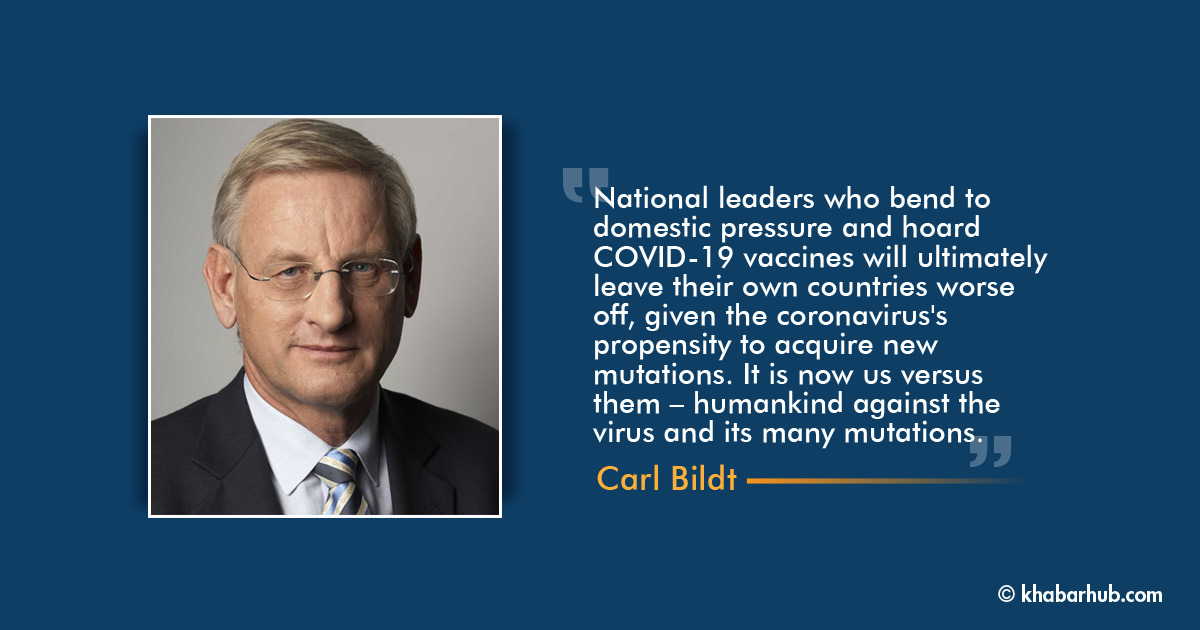With “vaccine nationalism” intensifying by the day, the global effort to end the COVID-19 pandemic is at risk of faltering.
As of mid-March, the coronavirus has infected approximately 120 million people globally, causing around 2.6 million deaths. Though these are huge figures, they represent merely a fraction of the global population, which means that the pandemic still has a very long way to go.
The good news is the historically unprecedented effort to tackle the crisis. Although bringing a new vaccine through the stages of development and approval normally takes up to a decade, pharmaceutical companies have completed the process in under a year.
The World Health Organization has already approved four COVID-19 vaccines for emergency use, and others are likely to follow soon. Moreover, ambitious new global mechanisms have been created in short order to facilitate the rapid and equitable distribution of vaccines around the world.
Apart from protecting us against a biological threat, a comprehensive, coordinated global response also has a clear economic justification. In our highly integrated global economy, the plight of one region will necessarily be felt elsewhere.
For example, since April 2020, the WHO’s Access to COVID-19 Tools (ACT) Accelerator, which includes all aspects of fighting the pandemic, has aided the fight against the virus by facilitating one of the fastest coordinated global public-health efforts in history.
And now, the COVAX facility has started deliveries of vaccines to at least 50 low- and medium-income countries around the world (though initial supplies have been limited in the early stages of vaccine production).
But aside from these initiatives, most countries are fixated on their own circumstances, neglecting the global connectedness that leaves all of us vulnerable until the virus has been stamped out everywhere. As the WHO has been emphasizing, no one is safe until everyone is safe.
As we are now witnessing firsthand, there is a high risk that new variants of the virus will frustrate or even derail the entire vaccination effort.
An unprecedented mobilization of resources by governments and the private sector, as well as philanthropic and multilateral contributions, has now reduced the funding gap to $22 billion.
We are currently dealing with the new British (B.1.1.7), South African (B.1.351), and Brazilian (P.1) variants, and there is no telling where the next one will emerge. The longer the pandemic continues, the more opportunities the virus will have to acquire dangerous new mutations that would allow it to evade the current vaccines. The question is not if but when.
Moreover, when new variants do emerge, we should anticipate that they will spread around the world sooner or later. We should know by now that national borders and physical distance offer only limited protection.
Apart from protecting us against a biological threat, a comprehensive, coordinated global response also has a clear economic justification. In our highly integrated global economy, the plight of one region will necessarily be felt elsewhere.
A startling recent study commissioned by the International Chamber of Commerce warns that, “the global economy stands to lose as much as $9.2 trillion if governments fail to ensure developing economy access to COVID-19 vaccines, as much as half of which would fall on advanced economies.” And reports by RAND Europe and the Eurasia Group offer similar conclusions.
All of our usual conflicts, rivalries, and sources of geopolitical tension of course remain; the question now is whether we can look past them when the situation demands it.
The cost of fighting the pandemic should be seen in this perspective. The ACT Accelerator initially needed $38 billion for 2020-21. An unprecedented mobilization of resources by governments and the private sector, as well as philanthropic and multilateral contributions, has now reduced the funding gap to $22 billion.
That is peanuts compared to the potential losses estimated above, not to mention the trillions of dollars that have already been spent to support households and businesses over the past year.
And yet, the threat of vaccine nationalism looms large. Governments are under intense domestic political pressure to secure vaccines for their populations before allowing doses to be sent elsewhere.
And some, like China, India, and Russia, have begun to use vaccine supplies and deliveries as an instrument in their foreign policy.
Yet, as tempting as vaccine nationalism may be for policymakers, it is ultimately self-defeating. Every new restriction ineluctably curtails the overall rollout and makes it more likely that vaccines will not reach the places where they are most urgently needed.
More than ever, we need an open, transparent, well-functioning global economy. And, more than ever, we need political leaders who behave like statesmen, not tacticians.
Make no mistake: we are facing a historic test of our ability to unite against a common threat. All of our usual conflicts, rivalries, and sources of geopolitical tension of course remain; the question now is whether we can look past them when the situation demands it.
It is now us versus them – humankind against the virus and its many mutations. We will stand or fall together.
(Carl Bildt was Sweden’s foreign minister from 2006 to 2014 and Prime Minister from 1991 to 1994, when he negotiated Sweden’s EU accession)
Copyright: Project Syndicate









Comment